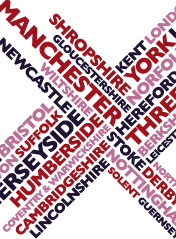BBC Local Radio
|
|
|
|---|---|
| Radio station ( public law ) | |
| reception | analog terrestrial , cable , satellite , DAB , Internet |
| Reception area | United Kingdom (FM, DAB) |
| Start of transmission | November 8, 1967 |
| Broadcaster | BBC |
| List of radio stations | |
BBC Local Radio is the name given to 40 regional radio programs of the British broadcaster BBC , which are broadcast for England and the Channel Islands . The target group are predominantly older citizens; more than half of the listeners are over 55 years old.
Some programs are only produced for a larger city and the surrounding area (BBC Radio London, BBC Radio Manchester), while others are produced for an entire region, such as the BBC Radio WM for the West Midlands . The other parts of the UK each have their own programs that are broadcast nationwide:
- BBC Radio Wales
- BBC Radio Cymru (in Welsh)
- BBC Radio Scotland
- BBC Radio nan Gaidheal (in Scottish Gaelic)
- BBC Radio Ulster
- BBC Radio Foyle (a radio station which is only a regional exit from BBC Radio Ulster)
program
Mostly word programs are broadcast, mostly news about the respective area, on weekends mainly sports reports, as well as light music. The night program is taken over by BBC Radio 5 Live . The proportion of words in the program has increased steadily over the years: at the beginning it was 55 percent, now it is three quarters; in the morning and in the afternoon, many programs have a purely word program.
history
The BBC's local radio stations gradually went on air in the 1960s and 1970s. The first local radio was BBC Radio Leicester; it began operations on November 8, 1967. BBC Radio Sheffield and BBC Radio Merseyside followed that same month.
There are currently the following stations (in the order of the first broadcast date, as far as it could be determined):
- BBC Radio Leicester, BBC Radio Sheffield and BBC Radio Merseyside (November 1967)
- BBC Radio Nottingham and BBC Sussex (January 1968)
- BBC Radio Stoke (March 1968); BBC Radio Leeds (June 1968)
- BBC Radio Bristol and BBC Radio Manchester (September 1970)
- BBC London, BBC WM and BBC Oxford (October 1970)
- BBC Radio Kent, BBC Radio Solent and BBC Radio Cleveland (December 1970)
- BBC Newcastle, BBC Radio Lancashire and BBC Radio Humberside (January 1971)
- BBC Radio Derby (April 1971)
- BBC Radio Cumbria (November 1975)
- BBC Radio Norfolk (September 1980)
- BBC Lincolnshire (November 1980)
- BBC Guernsey and BBC Radio Jersey (March 1982)
- BBC Radio Cambridgeshire (May 1982)
- BBC Radio Northampton (June 1982)
- BBC Radio Devon and BBC Radio Cornwall (January 1983)
- BBC Radio York (July 1983)
- BBC Radio Shropshire (April 1985)
- BBC Radio Bedfordshire (June 1985)
- BBC Essex (November 1986)
- others: BBC Tees, BBC Radio Leicester, BBC Coventry & Warwickshire, BBC Hereford & Worcester, BBC Three Counties Radio, BBC Radio Suffolk, BBC Surrey, BBC Radio Berkshire, BBC Radio Gloucestershire, BBC Wiltshire and BBC Somerset
The establishment of these new programs took place in competition with the establishment of private programs. The first independent local radio stations were LBC and Capital in October 1973; Clyde followed in December of that year.
Recently, the pressure on local programs to exchange programs with one another or to produce them together has increased. As early as 2010, five programs interconnected for a time: BBC Radio Leeds, BBC Radio York and BBC Radio Sheffield as well as BBC Radio Kent, BBC Sussex and BBC Surrey each produce a joint afternoon program and an early evening program in order to raise more funds for the To have morning program available. All in all, 15 percent of the total budget for all local radio stations should be saved, which would correspond to a volume of 15 million pounds. The savings proposals by BBC Director General Mark Thompson, which go hand in hand with considerable job losses, are politically very controversial. The BBC Trust has not yet fully discussed the austerity measures.
The local programs are currently heard by 7.22 million listeners per week (figures for the second quarter of 2011), which means a slight increase compared to the previous year (6.84 million listeners). Ten years earlier, the range was 8.29 million listeners per week. Most listeners are on BBC Radio London, BBC Radio Merseyside, BBC Essex, BBC Radio Solent and BBC Radio Newcastle.
Web links
- BBC Local Radio - official website
Individual evidence
- ↑ a b [1] (PDF file)
- ^ A b c Paul Chantler, Peter Stewart: Basic radio journalism . Focal Press, Amsterdam, Boston 2003, ISBN 0-240-51926-4 , pp. 3 f . ( limited preview in Google Book search).
- ^ A b c Colin Seymour-Ure: The British press and broadcasting since 1945 . Making contemporary Britain. Blackwell. 1991. Table 4.5 on p. 80 f.
- ↑ See the overview on the BBC website. Retrieved February 18, 2012.
- ↑ a b John Plunkett: BBC local radio to be hit hard by cost cutting. Hundreds of hours of local programming likely to be axed, with output expected to be syndicated between stations. In: The Guardian. September 23, 2011, accessed on February 18, 2012 (report on the austerity measures at the BBC with regard to local programs).
- ^ John Plunkett: BBC local radio to share output in budget squeeze. Afternoon programming to be networked across neighboring stations in Yorkshire and south-east of England. In: The Guardian. November 23, 2010, accessed February 18, 2012 .
- ↑ a b c Patrick Foster: BBC local radio: has the BBC scored an own goal with its cuts plans? Proposals to cut £ 15m from local radio budget, pool programs and reduce sports coverage outrage MPs and listeners. In: The Guardian. December 11, 2011, accessed February 18, 2012 .
